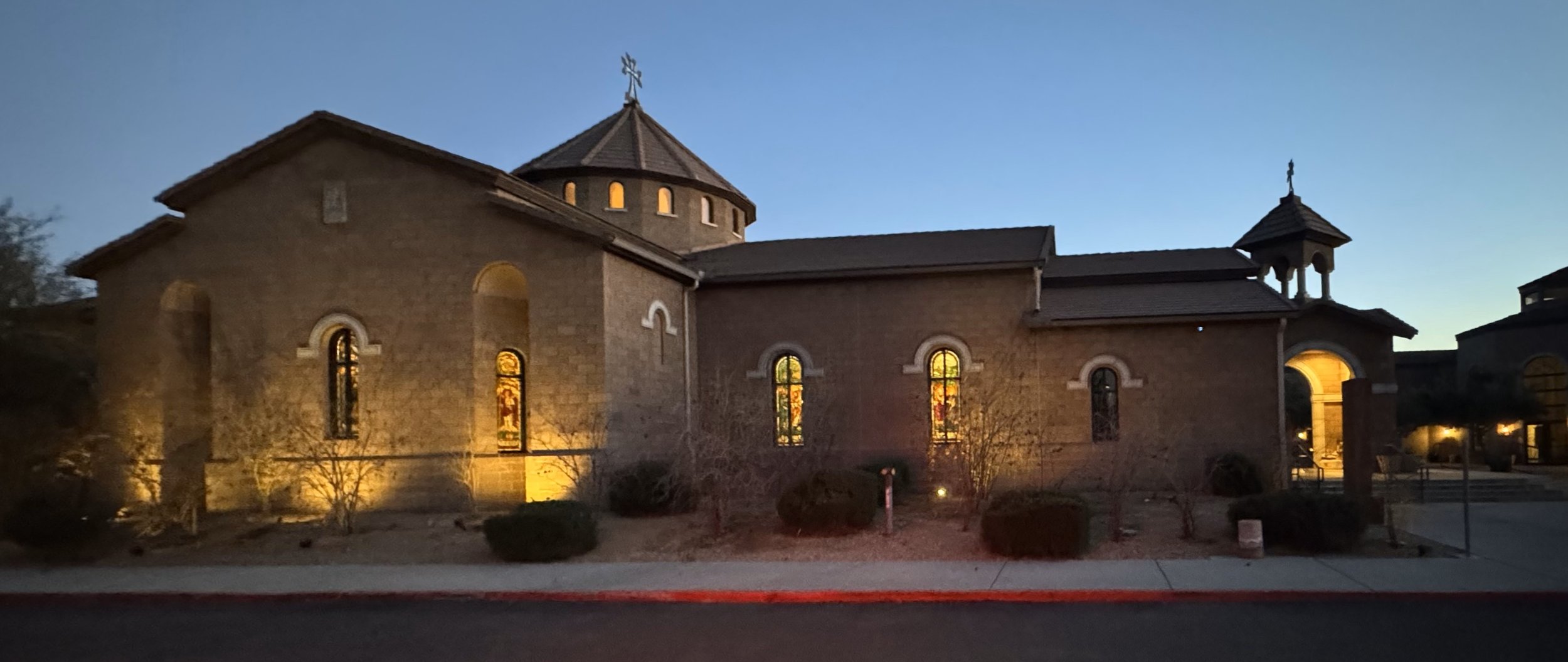About St. Apkar
The Armenian community in Arizona has a rich history, marked by resilience and a steadfast commitment to preserving their cultural and religious heritage. Central to this narrative is the establishment of St. Apkar Armenian Apostolic Church, the first and only Armenian Apostolic Church in the state.






























































Our Mission Statement
“Where Faith is Celebrated in God and our Community.”
St. Apkar Armenian Apostolic Church calls believers to Holy Baptism and to live in communion in which God’s presence is experienced, shared and celebrated within the rich culture of our Armenian heritage.
Empowered by the Holy Spirit, we strive to cherish and convey our more than 1700 year Christian values which are deeply rooted to help those in need, and to be an accepting and loving community for all people.
Therefore, as proud descendants of the first Christian nation on earth, we commit ourselves to faithful witness of Jesus Christ. Our ancestors died during the Armenian Genocide, as true inheritors of Christ’s sacrificial faith.
We are witnesses of the Risen Lord and we are to live as a resurrected nation. We share understanding, tolerance, truth, forgiveness, love, hope and peace.
The roots of the Armenian community in Arizona can be traced back to the early 1960s. In 1963, the community received its first formal leadership with the visit of Bishop Torkom Manoogian, then ecclesiastical leader for the Holy See of Etchmiadzin, Armenia. This visit led to the formation of a congregation, marking the beginning of organized Armenian religious life in the state.
Early Community Formation
Establishment of the Cultural Center
Over the years, as the Armenian population in Arizona grew, so did the desire for a dedicated place of worship and cultural preservation. In 1992, the community achieved a significant milestone with the dedication of the Armenian Church Cultural Center and Melikian Hall in Scottsdale. This center became the hub for religious services, cultural events, and educational activities, fostering a sense of unity and identity among Armenian families in the region.
Construction of St. Apkar Church
The aspiration to build a traditional Armenian sanctuary culminated in 2003 when the community initiated fundraising efforts for the construction of St. Apkar Armenian Apostolic Church. In 2005, His Holiness Karekin II, the Supreme Patriarch and Catholicos of all Armenians, visited Scottsdale to bless the ground for the new sanctuary. Construction commenced in 2008, and by September 2009, the 7,000-square-foot sanctuary was consecrated, standing adjacent to the existing cultural center. With a new home and under the leadership of Father Zacharia starting in 2007, the community blossomed, fostering spiritual growth and cultural enrichment.
Rev. Fr. Zacharia Saribekyan has faithfully led our parish since 2007, bringing spiritual guidance, cultural enrichment, and a deep sense of community to the St. Apkar Church. Click the link below to learn more about his inspiring journey and dedication to our faith.
Fr. Zacharia Saribekyan
Our Priest
For the estimated 3,000 to 4,000 Armenian families in Arizona, the establishment of St. Apkar Church was a monumental achievement. It provided a consecrated space for worship, allowing the community to practice their faith and uphold traditions intrinsic to their cultural identity. The church also became a symbol of resilience, reflecting the historical perseverance of Armenians, particularly in the aftermath of the Armenian Genocide of 1915.
Significance of the Church
King Apkar of Edessa
St. Apkar Armenian Apostolic Church is named after King Apkar (Abgar V) of Edessa, a revered figure in Christian history. King Apkar is traditionally celebrated as one of the first rulers to embrace Christianity. According to Armenian Church tradition, he corresponded with Jesus Christ during His ministry.
Suffering from a severe illness, King Apkar sent a letter to Christ, seeking healing. Christ replied, promising to send one of His disciples after His Ascension. St. Thaddeus later visited King Apkar, healed him, and baptized him, leading to the spread of Christianity in the region.
King Apkar’s faith and actions are considered pivotal in the early history of Christianity, symbolizing the transformative power of faith and devotion. Naming the church after St. Apkar reflects the Armenian Church’s connection to its rich spiritual heritage and its role as the first nation to adopt Christianity as a state religion in 301 A.D.
Who Was King Apkar?

Ongoing Community Engagement
Since its consecration, St. Apkar Armenian Apostolic Church has continued to serve as the focal point for the Armenian community in Arizona. It hosts regular religious services, Sunday school programs, cultural events, and commemorations, ensuring the transmission of Armenian heritage to future generations. The church's presence has also facilitated greater awareness and recognition of Armenian culture and history within the broader Arizona populace.
The history of St. Apkar Armenian Apostolic Church and the Armenian community in Arizona is a testament to the enduring spirit of Armenians in preserving their faith, culture, and identity, even far from their ancestral homeland.

"But seek first His kingdom and His righteousness, and all these things will be given to you as well."
— Matthew 6:33















